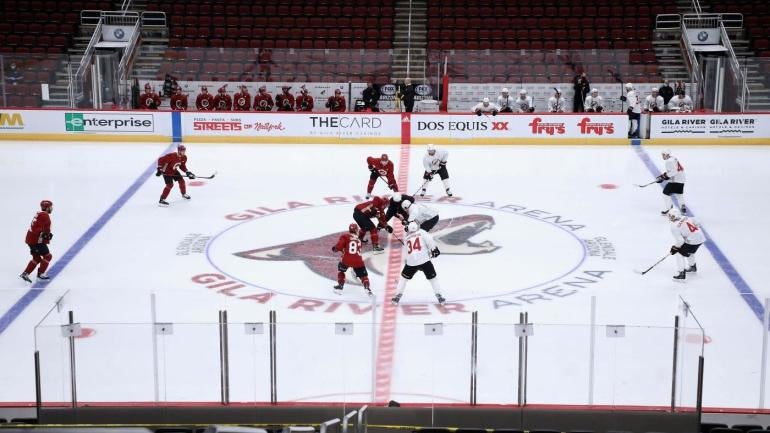
The NHL and its 31 teams swear they're doing everything that they can to eliminate racism from the sport. The social unrest amplified by events of 2020 have helped shine a light on race issues that have existed in hockey for decades. Before the start of this year's Stanley Cup Playoffs in August, Minnesota Wild defenseman Matt Dumba delivered a heartfelt speech about racism, its existence in the sport and the need to change the culture around hockey. Later that month, the NHL followed the lead of the NBA and postponed two days of playoff hockey as a form of protest against systemic racism and police brutality.
Seeing the NHL and its teams openly recognize racism and offer a commitment to change is a step in the right direction, but those gestures only mean so much if they're followed by meaningful change. Unfortunately, some of the early returns on those commitments have been disappointing.
The latest instance of that comes from the Arizona Coyotes, who just last month touted the fact their CEO had joined an NHL committee tasked with eradicating racism and discrimination. A few weeks later, the team used its first draft pick on Mitchell Miller, a player with a significant and concerning history of racism away from the ice.
As reported by the Arizona Republic on Monday, the 18-year-old Miller was convicted of "bullying" Isaiah Meyer-Crothers, a developmentally disabled, Black classmate four years ago.
Here are the details, via the Arizona Republic:
"Four years ago, Miller admitted in an Ohio juvenile court to bullying Meyer-Crothers, who was tricked into licking a candy push pop that Miller and another boy had wiped in a bathroom urinal. Meyer-Crothers had to be tested for hepatitis, HIV and STDs, but the tests came back negative, according to a police report.
Meyer-Crothers, also 18 and who now lives in Detroit, said Miller had taunted him for years, constantly calling him 'brownie' and the 'N-word,' while repeatedly hitting him while growing up in the Toledo suburb. Other students at their junior high confirmed to police that Miller repeatedly used the 'N-word' in referring to Meyer-Crothers."
According to Meyer-Crothers' mother, video surveillance footage also captured Miller "smashing Isaiah's head against a brick wall." She believes part of the reason Miller pled guilty was to prevent that video from being released in court.
The police report provides further gut-wrenching details of what Miller did.
The Coyotes, in light of the report, continue to stand behind the decision to draft Miller, saying "given our priorities on diversity and inclusion, we believe that we are in the best position to guide Mitchell into becoming a leader for this cause and preventing bullying and racism now and in the future."
Mitchell completed court-mandated community service and sent a letter to every NHL team acknowledging his transgressions and apologizing for his behavior. According to Meyer-Crothers' mother, Mitchell never personally apologized to her son for the pain he inflicted. Last week, more than two weeks after Miller's selection, the Coyotes published a statement from the player in which he said he is "extremely sorry about the bullying incident that occurred in 2016" and that he wants "to be a leader for this cause and help end bullying and racism."
Obviously, the team trusted his words and saw enough in Miller to believe that he was worth the PR headache that they had to figure would come after the draft. Whether it was the player's hockey ability or actual personal growth that convinced them, we may never know.
"Mitchell made a huge mistake, but we are providing him with a second chance to prove himself," Coyotes GM Bill Armstrong, who recently joined the team's front office and wasn't involved in the process of drafting Mitchell, told the Arizona Republic. "We hope that he uses his platform moving forward to raise awareness about bullying and to discourage this type of behavior."
A key part of that quote from Armstrong is the team "providing" Miller with a second chance. He hasn't really seemed to earn that second chance, at least not yet, and that's what makes the Coyotes' decision to draft him a bit harder to stomach.
Not only does it contradict the organization's supposed hard stance against racism, but it also sends an all-too-familiar message: A team recognizes a player's problematic behavior but are willing to give him the benefit of the doubt because he's talented and says he's sorry.
Some will argue that the Coyotes drafting this kid should be viewed in a positive light. Others will argue that Miller's age at the time of these events should play a factor. Kids make mistakes and kids do stupid things that they grow and learn from.
But anyone using age as a defense here also has to recognize that actions of the immature still often carry consequences. Miller hasn't seemed to suffer too many consequences as a result of his heinous transgressions. A terrible display of character and judgement as a kid shouldn't necessarily follow a person for the rest of their life, but in certain circumstances a person has to dig their way out on their own without the way being paved for them. He's still earned a scholarship to the University of North Dakota (which, in a statement, called Miller's conviction an "unfortunate incident") and was drafted about one round later than initially projected.
Ultimately, the problem is -- and continues to be -- a lack of significant change when it comes to behavior, approach and consideration with situations like these in the NHL. How are Black hockey players supposed to feel when they hear the NHL say it is committed to ridding the game of racism, yet a team is willing to take a chance on a player with a clear history of racist behavior before he's even had a real opportunity to show that he's changed?
This isn't an isolated circumstance of words ringing hollow, either. Earlier in October, the Hockey Diversity Alliance -- which was only founded four months ago to fight inequality in hockey -- made the decision to cut ties with the NHL because the organization didn't feel the league was serious about addressing issues of race in the sport.
"The support we hoped to receive from the NHL was not delivered, and instead the NHL focused on performative public relations efforts that seemed aimed at quickly moving past important conversations about race needed in the game," the HDA said in a statement. "We have waited many months for a response to the common sense HDA pledge we proposed and it is clear that the NHL is not prepared to make any measurable commitments to end systemic racism in hockey."
It's unfortunate, too, because this situation with Miller could have been one of the first real chances for the NHL and HDA to work together under a specific incident of racism involving a player. The two sides would have had the opportunity to consult one another and discuss how they should move forward.
If a young player with a track record of racial insensitivity is brought into the league, the HDA should be able to serve as the voice of those players who may feel uncomfortable or overlooked as a result. They should also be able to provide an idea of what sort of things they'd need to see from that incoming player in order to feel like they've showcased real change.
Assuming the relationship isn't irreparably fractured, there's still time for the league to revisit its ties to the HDA and ask for help navigating the current situation in Arizona, as well as any future situations like this one.
Despite all the lip service and nice gestures, it's hard to feel like league is making steadfast progress on real change when the patterns appear to be staying the same.






















